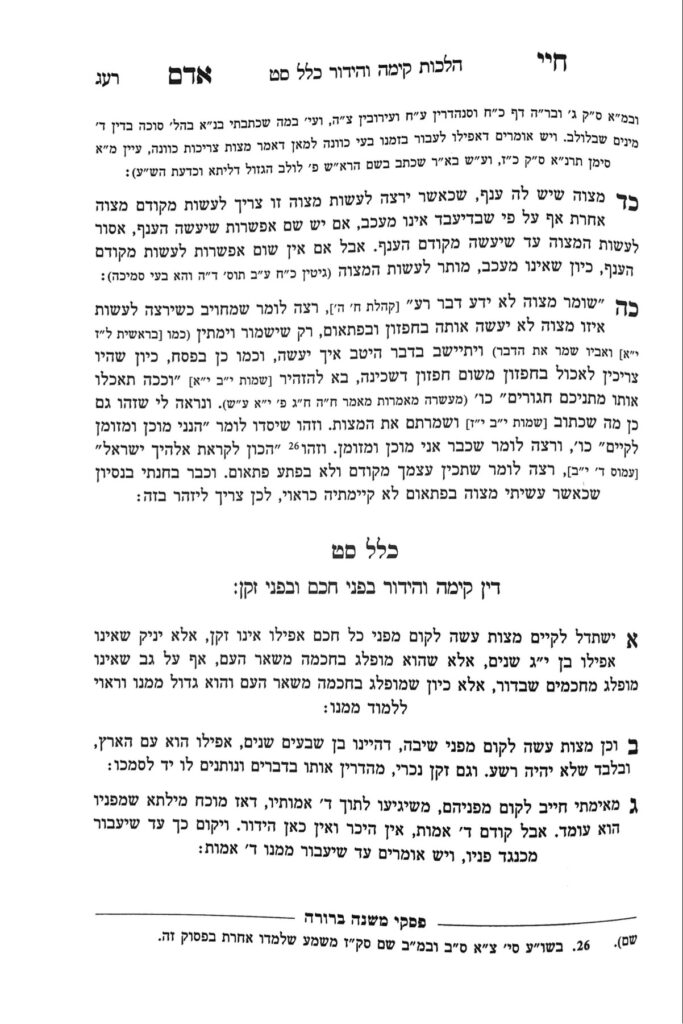We are continuing in siman 25. Today, we will discuss the concept of reciting the lesheim yichud component of the hineni muchan nusach.
It is well known that the lesheim yichud sentence was not introduced until the time of the Arizal. The Arizal, and subsequently the Shelah, advocated for saying it. The Noda B’yehuda, in two teshuvos, responds strongly against reciting it, explaining it is only for a person who is holding by a high level of knowledge of kabbalah. For the general public, who do not understand what they are saying, there is room for misunderstanding some of the concepts included in it.
Neither argue about the concept of reciting the hineni muchan, even though they are printed together.
The Noda B’yehuda continues, and writes that even if one argues that the lesheim yichud is necessary in order to perform the mitzvah lishmah, there is a concept of stam lishmah (default assumption of lishmah) which would apply to mitzvos. Although he adds this point, his main objection is what he wrote above, that the concepts mentioned in the lesheim yichud are beyond the average person.
In general, the practice of chassidim is to recite it, following the direction of the Arizal. However, the Divrei Chaim from Sanz, and those who follow the minhagim of Sanz, do not recite it, due to the objections of the Noda B’yehuda, so it is not monolithic amongst the chassidim.
The concern of the Noda B’yehuda is that people will not understand what they are saying, as we mentioned, and it will cause them to be kotzeitz b’netiyos, which literally means to cut off branches of the tree. If we look at the hashpaah of Hashem as a tree, Hashem has different branches–i.e., different vehicles–which bring down hashpaah to the world, through a process described in kabbalah. If a person focuses on one element, without paying attention to the rest of the picture, they are cutting a branch off from the tree, as it were. This is a form of avodah zarah, because they are looking at something as its own existence, rather than as connected to the source. Whereas someone knowledgeable in kabbalah knows it is not true, someone who is not knowledgeable may see certain kochos as independent, chas veshalom. This is a general concern with the concepts of sefiros.
The Gra is on record as being against reciting the lesheim yichud, but there are talmidim of the Gra who apparently did recite it.
The general approach of chassidim is to put a strong emphasis on the preparation for mitzvos. So their recitation of the lesheim yichud should be seen in the broader context of realizing that a mitzvah should not be done without proper preparation. This is something we can all learn from.
One point everyone agrees with is that the lesheim yichud states that we do every mitzvah b’dechilu u’rechimu, with love and fear. All agree that mitzvos should be done with love and fear.
A final point is that it is interesting to note that neither the lesheim yichud nor hineni muchan state explicitly that one is performing a mitzvah lesheim mitzvas bor’i, the concept of mitzvos lishmah. The one exception is tefillin, in which the hineni muchan states explicitly that one is putting on tefillin for lesheim mitzvas bor’i. It is preferable that one should fulfill mitzvos tzrichos kavanah by stating something to that effect, even if there is no clear text for it in the siddur. As the Chayei Adam pointed out, the hineni muchan is more a declaration of preparation rather than a statement of lishmah, and the lesheim yichud has the concerns mentioned above. If a person can think, or state, that the mitzvah they are about to perform they are performing for the sake of Hashem’s command, it would be preferable. They do not have to state the specific mitzvah they are about to perform.
Summary
One should refrain from the lesheim yichud unless it is their minhag to recite it, but should certainly learn from it the importance of preparation for a mitzvah.
One should preferably state in some way that they are about to perform a mitzvah lesheim mitzvas bor’i.



